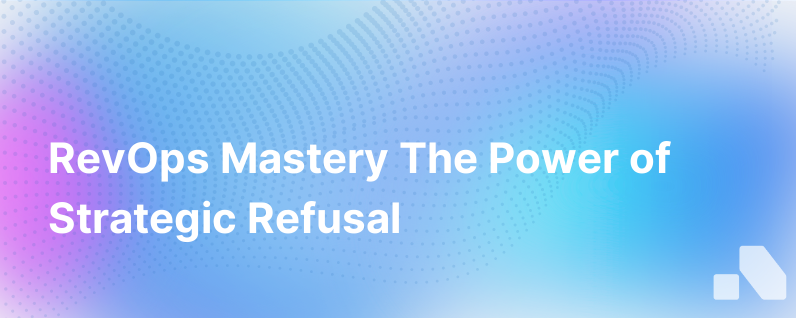
In the landscape of modern business, amidst the plethora of tasks and strategies vying for attention, the ability to wield the word "no" is not just an art—it is a critical skill within the realm of Revenue Operations (RevOps). The RevOps framework embodies a holistic approach to unifying marketing, sales, and customer success operations with the purpose of driving growth through operational efficiency. In this article, we will explore the significance of declining requests or initiatives that do not align with strategic goals and how saying "no" is an art that can fortify the integrity of your revenue operations.
The Role of RevOps
Before we delve into the fine nuances of refusal, it is imperative to clarify the role of RevOps. RevOps is not merely an amalgamation of operational processes; it is the strategic nexus that ensures each customer interaction is optimized for value creation. It does this by leveraging data, process optimization, and cross-functional collaboration to drive revenue growth and enhance operational efficiency across the entire customer lifecycle.
The Power of No in RevOps
In a discipline that is the bedrock of streamlining and synergizing operational activities, the ability to say "no" becomes paramount. Every request or initiative that passes through RevOps must bear the scrutinizing question: Does this align with our broader strategic objectives and revenue goals? If the answer is not a resounding "yes", then a gentle but firm "no" becomes the guardian of your strategic objectives.
Preserving Strategic Focus
RevOps leaders are frequently bombarded with an array of requests from different functions within an organization. These can range from implementing a new CRM tool to altering a reporting process. The danger of acquiescing to every demand is threefold:
- Resource Dilution - Diverting energy and personnel to non-critical tasks.
- Distraction - Derailing focus from initiatives that drive real growth.
- Complexity - Introducing unnecessary complexity into systems and processes.
By saying "no", RevOps preserves the coherence of the strategic focus, ensuring that resources are channeled effectively and priorities remain uncontested.
Cultivating an Operations-First Culture
Saying "no" is also instrumental in nurturing an operations-first culture within a company. This is a mindset that acknowledges the integral role of operational capabilities as the backbone of sustainable growth. By abstaining from tasks that add operational heft without tangible benefit, RevOps demonstrates a commitment to practicing what it preaches.
Enhancing Cross-Functional Collaboration
The art of saying "no" can paradoxically act as a catalyst for more effective cross-functional collaboration. It compels teams to collectively deliberate the alignment of a request with strategic goals, facilitating a shared understanding of priorities. Thus, a "no" from RevOps often jump-starts a valuable discussion on what truly matters.
Fostering a Data-driven Approach
Artful refusal is steeped in data. RevOps is the custodian of data integrity and must ensure that data-driven reasoning underpins decision-making. If a proposed action does not stand up to analytical scrutiny, RevOps must decline and steer the conversation back to what the data suggests.
The Art of Saying No
The artistry of saying "no" resides not in the refusal itself but in the manner it is conveyed and justified. It is crucial to understand that "no" is not an end but a redirection towards more optimal solutions. Here's how to say "no" with finesse:
Communicate with Empathy
Saying "no" with empathy requires acknowledging the merit behind the request while expressing the rationale for refusal. This approach validates the requester's effort and opens the door for future proposals that may be aligned with strategic aims.
Provide Clear Reasoning
Backing your refusal with clear, data-driven reasoning helps others understand the decision-making paradigm of RevOps. Demonstrating how the decision ties back to strategy disarms potential resistance.
Suggest Alternatives
When saying "no", offer alternatives when possible. If a requested action isn't viable, suggest different ways to achieve similar outcomes. This shows commitment to problem-solving while preserving efficiency.
Be Consistent
Consistently applying your criteria for saying "no" will earn you respect over time. Teams will come to appreciate that RevOps is not a hurdle but a guiding force ensuring alignment with strategic imperatives.
Educate on RevOps Principles
Use each "no" as an opportunity to educate your peers on RevOps principles. The more your colleagues understand the drivers of RevOps decisions, the more they can self-filter their requests, leading to a more streamlined operation.
Follow-Up
After a refusal, it's good practice to follow up on the subject. This can prevent any lingering feelings of dismissal and can demonstrate your interest in the team's long-term success and contributions.
Conclusion
In summary, the art of saying "no" within RevOps is an exercise in strategic integrity, focus, and operational efficiency. It is about making tough decisions that safeguard the foundations of a streamlined revenue-generating engine. Saying "no" is not about being obstinate or uncooperative; it is an essential practice that, when executed with skill, can enhance collaboration, drive strategic alignment, and foster a culture of operations-first thinking. Embracing the art of saying "no" can strengthen your RevOps framework, ultimately leading to a more resilient, efficient, and productive organization.